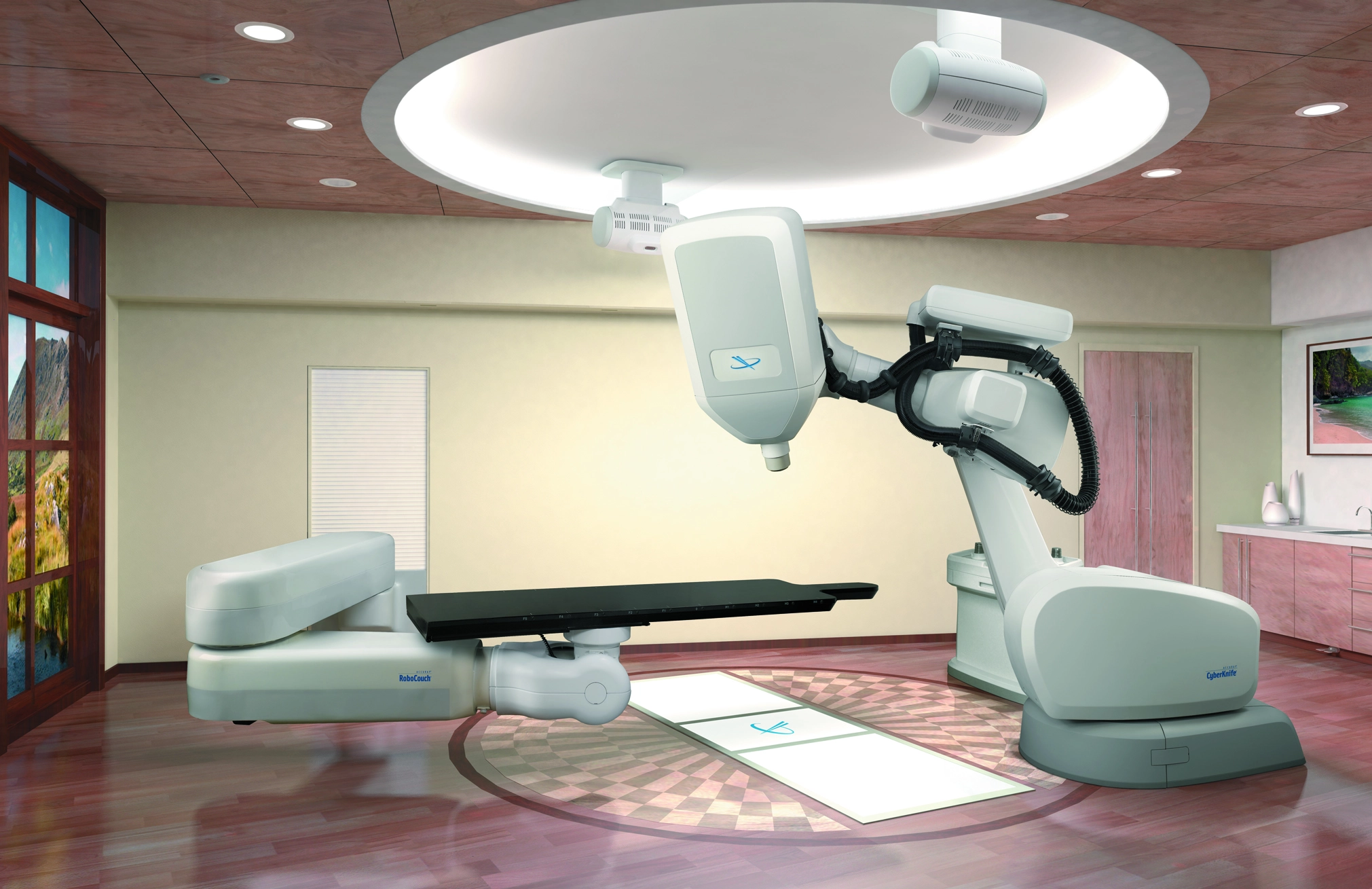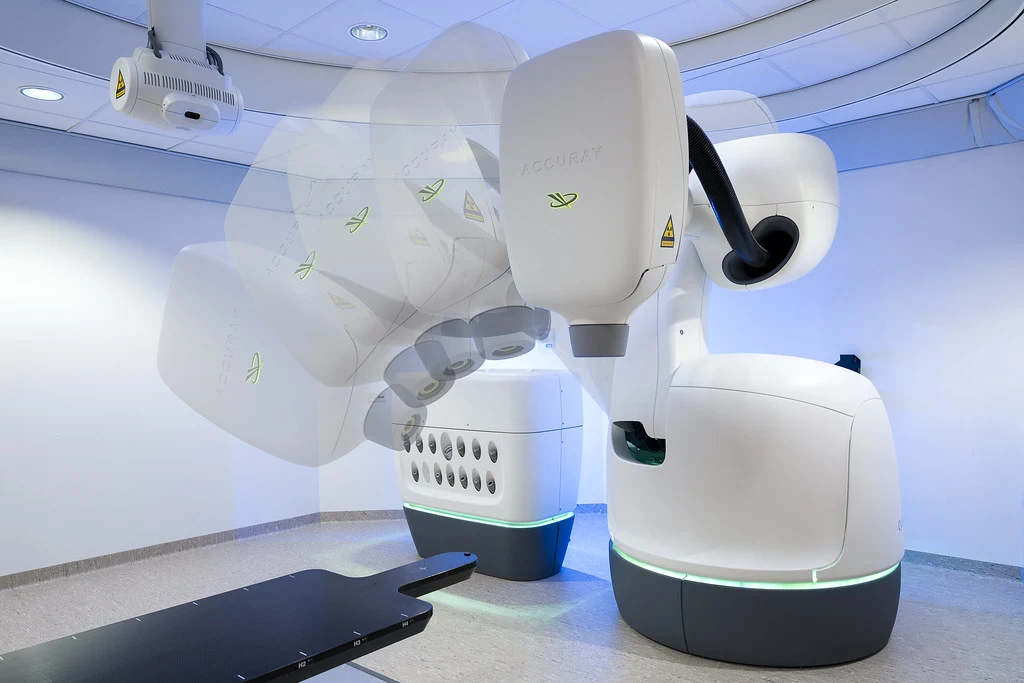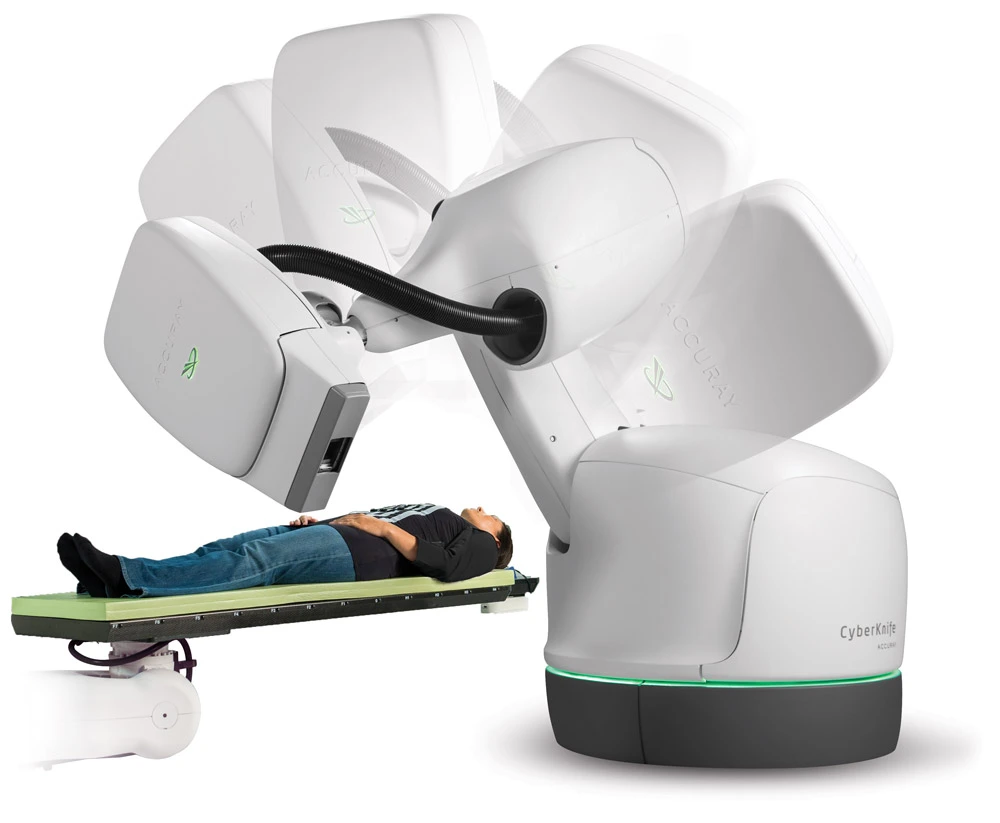Calls for Ukraine
Calls for Europe
Calls for USA

In recent years, Turkey has strengthened its position as one of the global leaders in the field of high-tech medicine. The country is actively investing in medical infrastructure. In 2023, total investments in healthcare exceeded $10 billion, a significant portion of which was allocated to the development of cancer centers. One of the innovative cancer treatment methods available in Turkey is stereotactic radiosurgery using the CyberKnife system. These systems are installed in several leading clinics in Istanbul, Ankara, and Izmir, where specialists trained in the USA and Europe practice.
CyberKnife is a high-precision robotic system used for radiosurgical treatment of tumors that combines computer navigation, robotics, and linear accelerator technologies. Unlike traditional radiation therapy, CyberKnife does not require surgical intervention and allows tumors to be targeted with millimeter precision without damaging surrounding healthy tissue.
The system automatically tracks the patient’s movements and adjusts the direction of the radiation beam in real time. This is especially important for treating tumors in mobile areas, such as the lungs or liver.
CyberKnife treatment is used to treat both benign and malignant tumors, including those located in the brain, spine, prostate, and pancreas. The course of cyberknife radiation treatment usually takes from 1 to 5 sessions and does not require hospitalization. This makes the method comfortable and safe for patients.
Compared to other countries, stereotactic radiosurgery in Turkey offers a number of advantages. The most important of these are listed below.

Turkish clinics actively implement the latest models of the CyberKnife system, including the M6 and G4 versions from the American company Accuray. These systems enable non-invasive treatment of tumors in nearly any part of the body (brain, spine, liver, and lungs) with an accuracy of up to 0.5 mm. The devices are equipped with a robotic arm and a real-time motion tracking system. This eliminates the need for rigid patient fixation and allows the system to adapt to respiratory or spontaneous movements.
CyberKnife radiation treatment is available at major cancer centers in Istanbul, Izmir, Ankara, Bursa, and Antalya, including facilities such as Anadolu Medical Center, Memorial Hospital, and Liv Hospital. Many of these clinics are internationally accredited by JCI and collaborate with universities and research institutes.
Radiosurgery in Turkey is a rapidly developing field, supported by significant investments from both the government and private sector. Over the past five years, the number of trained specialists in radiation therapy has increased by more than 40%. Physicians working with CyberKnife systems receive training at certified centers in Europe and the United States, including the Accuray Training Center in California.
Treatment is carried out by a multidisciplinary team, which includes a radiation oncologist, a medical physicist, an oncologist, and a neurosurgeon. This ensures accurate diagnosis, precise treatment planning, and ongoing monitoring of patient progress. In some Turkish clinics, PET-CT scans are performed before and after the treatment course to evaluate the effectiveness of radiation. This is particularly important in the treatment of brain and prostate tumors.
One of the main factors that attracts patients to Turkey is the balance of cost and quality. The average cost of CyberKnife treatment in Turkey’s leading clinics ranges from $5,000 to $8,000 per course (the exact price depends on the location of the tumor and the number of treatment sessions). This is 40–70% cheaper than in Germany (starting from €9,000) or the USA (starting from $18,000–20,000).
The price often includes: the initial consultation, treatment planning, the radiosurgery, follow-up visits, and in some cases, transportation and patient coordination services.
The more affordable pricing is a result of active government investment in infrastructure, rather than a compromise in quality. At the same time, waiting times in Turkish clinics are also minimal – patients can usually receive a consultation the next day after submitting medical documents and begin treatment within 3 to 5 working days.

1. Patient preparation
CyberKnife radiation treatment begins with high-precision imaging: MRI, CT, or PET-CT. Based on these scans, a radiation oncologist and medical physicist develop a personalized irradiation plan. For 3D tumor modeling, Turkish doctors use advanced software that takes into account the patient’s individual anatomy. In some cases, the radiologist places special markers to enable precise tumor tracking.
2. Carrying out the procedure
The CyberKnife radiation oncology is non-invasive and outpatient, without anesthesia or surgical intervention. The patient lies on a treatment table while the robotic arm delivers radiation beams from multiple angles. Each session lasts from 30 to 90 minutes, and the full course typically includes from 1 to 5 sessions. The system tracks tumor movement in real time, eliminating the need for rigid body fixation.
3. Rehabilitation and follow-up
Hospitalization is not required after CyberKnife treatment – patients can return to normal activities the same day. Side effects are minimal. Follow-up MRI or CT scans are usually performed 2 to 3 months after treatment. Turkish clinics also offer remote monitoring and consultations, including interpretation of images and treatment plan adjustments when needed.

CyberKnife radiation oncology is used for radiosurgical treatment of both malignant and benign tumors, especially in anatomically complex or hard-to-reach areas where conventional surgery is associated with high risk.
The most common indications include:
CyberKnife surgery is also used in cases where general anesthesia is contraindicated or when repeat irradiation using other methods is not possible. In Turkish clinics, the system is widely used to treat patients with severe concomitant diseases, limited organ function, and age-related contraindications to surgery.
The cost of CyberKnife radiation oncology in Turkey includes:
1. Diagnostics
2. Treatment planning
Based on the imaging results, physicians create a 3D model of the tumor and calculate the radiation dose. This requires coordinated work from the radiation oncologist, medical physicist, and equipment engineer.
3. Radiosurgery
The treatment course usually consists of 1–5 sessions, depending on the location and type of tumor. The average cost of a full course is $5000–$6000.
4. Post-treatment monitoring
Follow-up examinations, repeat MRI/CT scans, and physician consultations may be included in the price or paid separately, depending on the clinic.
On average, the total cost of CyberKnife treatment in Turkey, including preoperative diagnostics, ranges from $7,500 to $9,500.
For comparison:
Despite more affordable pricing, leading Turkish clinics use the same equipment as Western centers and operate according to international treatment protocols. This allows patients to receive high-tech cancer care without overpayments and with minimal waiting time.

The leading medical centers in Turkey offering CyberKnife treatment include Anadolu Medical Center, as well as Memorial Hospital and Liv Hospital. These clinics are equipped with the latest equipment (including CyberKnife M6), are accredited according to international standards (JCI), and collaborate with American cancer centers, including Johns Hopkins.
Anadolu and Liv Hospital are especially renowned for their high precision in radiosurgical treatment of brain and spine tumors. Memorial Hospital is also actively involved in research projects focused on radiosurgery.
Below are reviews from patients who underwent CyberKnife treatment in Turkey.
Anna, 52 years old, brain tumor
When I was diagnosed with meningioma, I was in shock. In my local clinic, the neurosurgeon suggested surgery, but the risks were high due to the location of the tumor. In Turkey, doctors offered an alternative option. CyberKnife was a lifesaver for me. The procedure lasted only an hour, no pain, no incisions. Six months later, my MRI scan showed a significant reduction in the tumor size. I returned to a normal life and work.
Vladimir, 58 years old, prostate tumor
The diagnosis of prostate cancer shattered many of my plans. A doctor at Memorial Hospital recommended CyberKnife as an alternative to surgery. The procedure was painless and was performed in a comfortable setting. Most importantly, all functions were preserved, which I had been very afraid of losing. A year later, my test results showed a complete absence of cancer cells.
Irina, 39 years old, acoustic neuroma
The tumor threatened complete hearing loss and facial nerve paralysis. Doctors at Anadolu suggested CyberKnife surgery. I agreed and didn’t regret it. My hearing was partially preserved, and there were no complications. The procedure took only an hour and a half, and the next day I was already at home.

How long does the treatment last?
The duration of CyberKnife treatment depends on the type, size, and location of the tumor. A single session usually takes from 30 minutes to 2 hours. Most patients undergo 1 to 5 sessions over a period of 1-2 weeks. Simple cases, such as small metastases, may require only one procedure, while complex brain or spine tumors are usually treated in 3-5 sessions. It is important to note that hospitalization is not required between sessions – patients can continue with their normal daily activities.
What are the possible side effects?
CyberKnife treatment is associated with minimal side effects compared to traditional radiation therapy and surgery. Possible reactions include:
Serious complications are extremely rare due to the high accuracy of the system. Most patients return to their usual routine the day after the procedure.
Can CyberKnife be used more than once?
Yes, CyberKnife can be used multiple times, which is one of its major advantages. Re-treatment is possible in cases of tumor recurrence at the same location, new metastases, incomplete response to the initial treatment, or progression of disease in other areas. The decision to repeat treatment is made on an individual basis, depending on the patient’s overall condition, tumor location, previous radiation dose, and time elapsed since the first treatment. The minimum interval between treatment courses is usually at least 6 months.
As one of the leaders in the field of medical tourism, MedTour offers CyberKnife treatment in the best clinics in the world. To receive a free consultation, call us or fill out the feedback form. Our MedTour medical coordinator will answer all your questions, help select a suitable clinic and physician, and handle all organizational issues related to treatment in Turkey.
You can learn more about the possibility of CyberKnife treatment in Ukraine by following the link.
Please rate the work of MedTour
